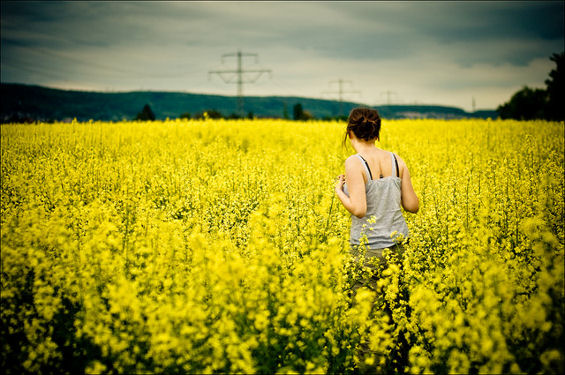The gerbera daisy that I had planted in an old green ceramic pitcher on my back porch isn’t red anymore. In fact, the red bloom shriveled and fell off weeks ago. But the stem and the leaves that were left behind, now they have died too. At least that’s my initial diagnosis. With my plastic watering can in tow, I tried to revive it this morning, sprinkling a little life onto the dirt in the form of water, tucking in the thin brown leaves when the stems I pulled on wouldn’t give way.
I repeated this kindness again and again — to the potted geraniums that still had plenty of life and just needed a good pruning, to the impatiens that sat shriveled in the mulch, their chunky stems growing translucent in the stress of the drought, to the kale that hardly seemed to notice it’s been dry. I filled my can, struggling when the fullness made it heavy, easing as I emptied it again and again on the thirsty plants that I used to call a garden.
Besides the daisy, I also lost five tomato plants, two eggplant seedlings, two potato hills, and two zucchini vines that just never had a chance. I’m not even going to talk about the grass. The basil and the beets might make it. Might. The thyme and the marjoram are my priority, since their survival this season means years of tasty stir fries and sauces. Overall, the casualties were steep, and I can blame it on the rain. Rather, the lack of rain.
As I was pulling up the plants in the garden, I ran my hand through the dirt — light, chalky dirt. Just a couple of months ago, I remember cultivating that soil so I could plant seeds and tender shoots. It was thick and heavy then, wet from Spring rains, loaded with bugs and worms.
The worms. What has happened to the worms? Now that I think about it, I didn’t see one worm this morning, haven’t smelled them rising to the surface and gathering on the sidewalk in the rain. I must add the worms to the list of casualties.
That’s probably why the birds have gone, too.
The rain fell lightly for a few minutes in our city on Sunday. I didn’t see evidence of it at my house, but as I walked into the Indianapolis Art Museum with my friend’s young sons, we felt the drops on our heads. We were still several yards away from the door when it started; others were milling around outside as well. None of us ran, though. In fact we slowed. It’s been one of the driest summers on record in our area, and even the children know now that we need rain. They would have been happy for it to fall plentifully on their backs, to make puddles for them to stomp in.
Thankfully, we still have water to drink and to cook with and to wash our clothes and our bodies. The boys have had water balloon fights and gone swimming this summer. Their lives are still blissfully aquatic. But they know grass isn’t usually yellow and brown, not in our city. As we walked through the gardens on the way into the museum and the drops fell for just a moment, they knew the plants need water to survive. That we need water to survive.
Boys in this part of the world don’t usually take note of such things.
If the rain doesn’t come soon, and often, the geraniums and the impatiens and the basil won’t make it. They too will be pulled and discarded on the compost pile unless I fill the bucket again and again, every day, or at least every other day, and drop a little water at the base of their stems and on the surface of their leaves.
Until the sky opens, I’m going to have to learn nature’s cues, watching the soil darken and lighten, sensing when I need to add more water.
That’s the only way to help these plants of mine survive the drought, if I am the rain to them.
Photo by by Hey Pictures. Creative Commons, via Flickr. Post by Charity Singleton.
______________________
- Grammar for a Full Life Book Club: On Becoming Less Possessive - June 16, 2021
- Grammar for a Full Life Book Club: Chilling Out on the Grammar Rules - June 9, 2021
- Grammar for a Full Life Book Club: A Passive Voice - June 2, 2021


Donna says
“…. if I am the rain to them.”
I can’t say why I love these words… I just do.
Maureen Doallas says
The word “tender” in its several meanings applies here. Lovely post.
Will Willingham says
The worms coming up in the rain — almost a more powerful Spring smell to me than spring flowers for some reason.
I don’t take care of a garden — not willing to be the rain or the weeder or the digger or anything else. But this picture of tending things that simply can’t go off looking for a way to take care of themselves. A curious dependence, I guess.
Charity Singleton says
Donna – thank you.
When I started writing this piece, there was a bit of resentment that I HAD to be the rain. As I wrote – and thought and prayed – I realized it is a blessing to care for things and people that way. I think the word is stewardship.
Maureen – yes, tender is the word as I brought load after load of water to prop up vulnerable plants. It’s since rained a bit here – not enough, but some – and some of the plants I mentioned, like the beats and the basil, are hardier now. I don’t have to be the rain quite as often.
Megan Willome says
Just wanted you to know that within two paragraphs, I knew it was you writing. I verified, but I was right. That, my friend, is voice.
Charity Singleton says
Megan – That makes me smile. I’ve worked hard for that voice!
Monica Sharman says
Another thing the boys don’t notice is that you do. Will they ever notice that? A friend told me, they may never.
I was so sad to see the low water level at Blue Mesa Reservoir on the way to my in-laws’ last month. I could see the bottom of the bridge columns, whereas just a couple of years ago the water was so high it almost touched the bottom of the bridge itself.
Thanks for your words which quenched my thirst today.
Charity Singleton says
The noticing might be a kind of stewardship all its own, I’d say. You notice much, my friend.
L. L. Barkat says
And here we are drowning. My impatiens lost to overwatering.
My. How can I be the sun to them? 😉
Charity Singleton says
Such different needs, yet the same interdependence. Somehow, I think we do figure out how to be what those around us need us to be. Praying for sun for you all.
Diana Trautwein says
Lovely, lovely work, Charity. Praying for more rain, even as you continue to be the rain for your garden.
Charity Singleton says
Thank you, Diana. It rained enough recently that I will have to mow this weekend, but it’s not enough to sustain life yet. Too little rain here; too much rain elsewhere. The rain falling and not falling on the just and the unjust. Poetic, isn’t it?
Linda says
This puts into words so perfectly the way it was here last summer Charity. We had to make choices about where to help and where to simply let go. That was the hard part about being the rain. Praying for rain (for we still need it here too).
JB Wood says
Beautiful, Charity. You’ve really notched up your powers of spinning the words. Here’s to more rain.
ed cyzewski says
In playing with the rain metaphor a bit, I think that during the times of drought it’s tough to believe that it will ever rain again.